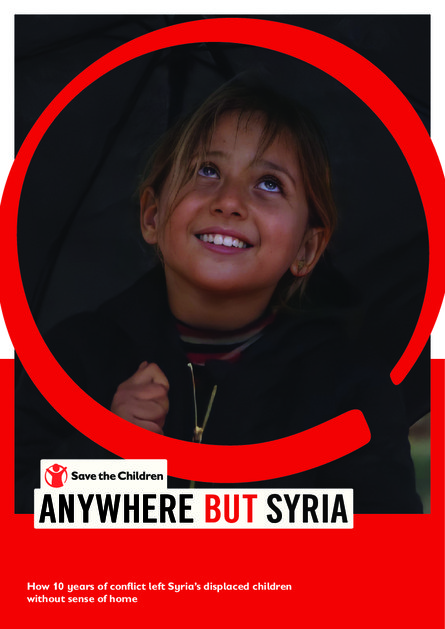
After ten years of war, the vast majority of Syria’s children cannot imagine a future in their country, according to a new report by Save the Children. On average, 86% of Syrian refugee children surveyed in Jordan, Lebanon, Turkey and the Netherlands said they would not want to return to their country of origin. Of children displaced inside Syria, one in three would rather be living in another country. Children who fled their homes are struggling to feel safe where they are now, as around two in five children of those surveyed by Save the Children said they face discrimination and a lack of education. Many feel they have no say over their future.
Every aspect of children’s lives has been torn apart, leaving them uprooted and without a real sense of home, according to a Save the Children report that was published today. For the report 'Anywhere but Syria’ – the largest piece of research of its kind by Save the Children – the organisation interviewed over 1,900 displaced children and their caregivers inside and outside Syria. The report finds that, of those interviewed, only 3% of the children surveyed in Turkey, 9% in Jordan and the Netherlands, and 29% in Lebanon want to return to Syria;
For children across all countries, an end to violence in Syria (26%) was most frequently mentioned when asked about their biggest wish for the future, followed by education (18%); 44% of all children in the study had experienced discrimination in their neighbourhood or in school. Inside Syria, 58% reported being discriminated against; Within the same sample, 42% of respondents were not attending school, with only 31% having access to learning in Lebanon, and less than half (49%) in Jordan.
Of all children who participated in the research, those displaced inside Syria felt the least connected to their communities. They were significantly more likely to report having experienced discrimination than their peers in Jordan or Lebanon, despite being in their country of origin.
Even before the harsh economic impact of the COVID-19 crisis, 80% of people in Syria had been living below the international poverty line[ii]. Recent figures have shown that 6.2 million of the country’s children are going without food.
The hardship of Syrian children and their families has not stopped at the country’s border, Save the Children said. In Lebanon —gripped by an economic crisis, political instability, COVID-19 outbreaks, and the impact of last year’s explosion in Beirut — nine out of ten Syrian refugee families are living in extreme poverty, according to the UN.